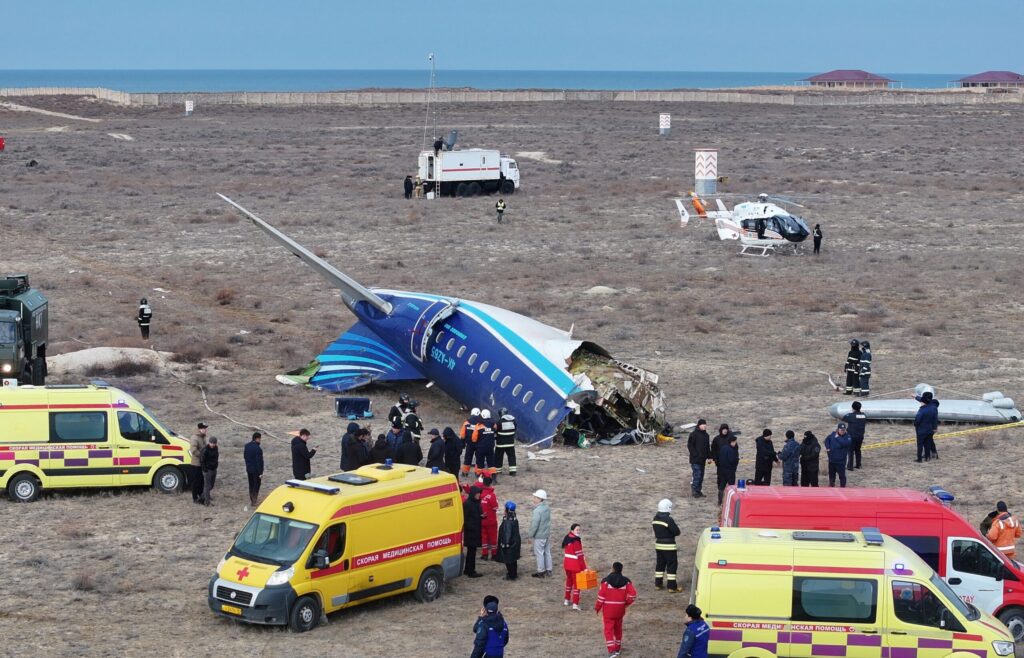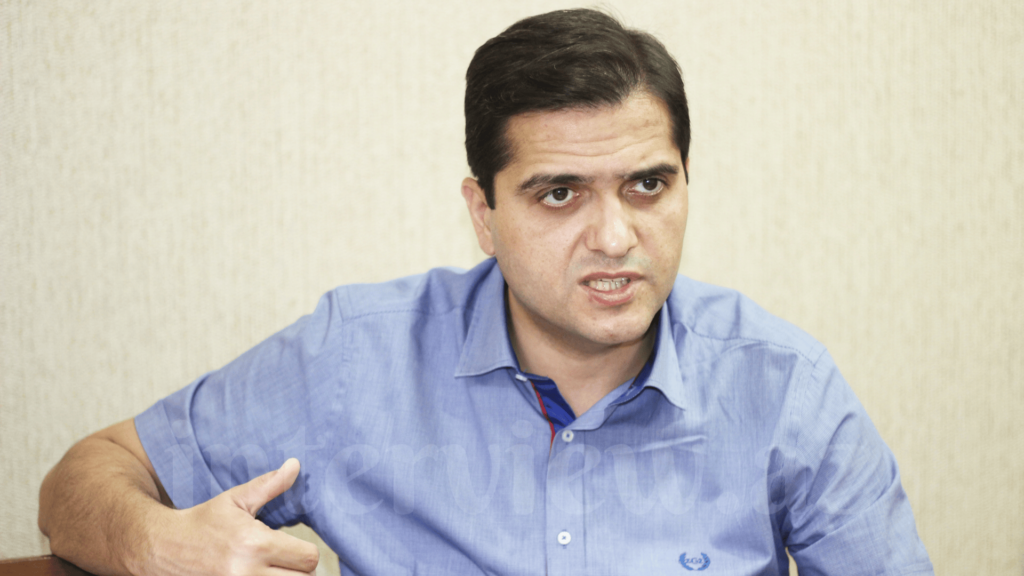Azerbaijani-Russian relations at a new stage: causes of tension and future prospects
Relations between Azerbaijan and Russia
In recent months, relations between Azerbaijan and Russia have grown increasingly tense. Key events that have contributed to the escalation include the downing of an Azerbaijani passenger plane, police raids targeting Azerbaijanis living in Russia, and mutual accusations in the media and at the diplomatic level.
While official Baku claims it is trying to resolve the situation within the framework of international law, experts believe Russia’s response – passive in some cases and openly aggressive in others – is pushing the relationship into a new phase of crisis.
The plane incident

The incident involving the AZAL passenger plane shot down in December 2024 near the city of Aktau in Kazakhstan marked a turning point in Azerbaijan-Russia relations.
The Azerbaijani side claims the aircraft was downed by Russian air defense systems. President Ilham Aliyev, drawing international attention to the case, stated that the incident represented a grave violation of international law.
According to available information, the order to fire was given directly by Major General Aleksandr Tolopilo, commander of the 51st Air Defense Division of Russia’s 4th Guards Army. The missile system involved was a Pantsir-S, under the command of Captain Paladychuk. Russia’s internal investigation downplayed the incident, and Tolopilo was later promoted and reassigned.
Azerbaijan’s Prosecutor General’s Office and other state institutions have announced plans to launch international legal proceedings over the case. According to President Aliyev, the matter may be brought before the International Court of Justice or other international tribunals.
While a specific court has not yet been named, Azerbaijan refers to legal mechanisms used in the MH-17 case.
President Aliyev raised the issue publicly for the first time on July 19, 2025, at the Global Media Forum in Shusha: “Our AZAL aircraft was shot down near the Kazakh city of Aktau. To this day, no one has taken responsibility for it. This is a blatant violation of international law.”
Although he did not name Russia directly, Aliyev’s message was clear: “Seven months have passed, yet there has been no explanation or acceptance of responsibility. This kind of behavior does not match the spirit of strategic partnership.”
The Russian side maintains that the investigation is ongoing and no official conclusions have been reached. On July 21, Kremlin spokesperson Dmitry Peskov commented: “Sometimes there are difficult periods in relations between two countries. This is one of them. But we hope it will pass.”
He also stressed that “bilateral cooperation is mutually beneficial and rests on a solid foundation.”
Responding to a question about the AZAL plane, Peskov said the investigation is being handled by Russian authorities, but Azerbaijan has the right to go to court:
“If Baku chooses to bring the matter to an international court, that is their right. We will await official decisions.”
He added that Moscow considers respect for the rights of Russians in Azerbaijan important — just as Azerbaijanis in Russia are seen as “a law-abiding and respected community.”
Pressure on the diaspora in Russia
In June 2025, Russian police in an operation in Yekaterinburg shot and killed two Azerbaijani nationals. Azerbaijan labeled the incident a “demonstrative killing,” launched an investigation through the Prosecutor General’s Office, and demanded compensation.
In response, Azerbaijani authorities detained several Russian citizens in Baku, including employees of Sputnik Azerbaijan. Russia viewed the arrests as a “hostile step,” summoning the Azerbaijani ambassador to the Foreign Ministry. Baku, in turn, summoned the Russian ambassador and demanded clarification over the Yekaterinburg incident.
According to Nikolay Mitrokhin, a researcher at the University of Bremen (Germany), the operations appear to be politically motivated:
“Putin is displeased with Aliyev and decided to use the Azerbaijani diaspora in Russia as a tool of pressure. In this context, the head of Russia’s Investigative Committee, Aleksandr Bastrykin — backed by security agencies — has taken center stage.”
‘Z-bloggers’ and media pressure

Azerbaijani political analyst and head of the Atlas Research Center, Elkhan Shahinoglu, says Russian media have recently launched a campaign against Azerbaijan.
On his Facebook page, he writes that a group of “Z-bloggers,” created within the Kremlin, has spun out of control and—through its chauvinistic rhetoric—now overshadows even the official state line.
He emphasizes that figures like Vladimir Solovyov and Igor Strelkov (Girkin) are portraying Azerbaijan as a military target and openly threatening President Ilham Aliyev:
“Z-bloggers write about bombing Azerbaijan, deporting Azerbaijanis from Russia, and demand immediate action from the Kremlin. These people could be dismissed as marginal, but their statements resonate with parts of Russian society and reflect rising chauvinist sentiments.”
Shahinoglu also warns that Russia may begin imposing economic and administrative pressure on Azerbaijanis, including rejecting agricultural imports and targeting businessmen’s assets through tax inspections.
He notes that this rhetoric is not only shaping public opinion but is also being used as a tool of pressure against the Azerbaijani government. According to him, some segments broadcast on Russian state TV have directly questioned Azerbaijan’s territorial integrity and sovereignty – prompting strong reactions from official Baku.
A shift in diplomatic language: “We are neutral, but not indifferent”

A particularly significant moment in the context of Azerbaijan–Russia relations was President Ilham Aliyev’s remarks on Ukraine during his speech at the Global Media Forum in Shusha. Referring to the principles of international law, Aliyev expressed support for Ukraine’s territorial integrity:
“We recognize the territorial integrity of Ukraine, and this stems from Azerbaijan’s respect for international law.”
Aliyev also emphasized that Azerbaijan continues to provide humanitarian aid to Ukraine:
“We are neutral, but not indifferent.”
This wording reflects Azerbaijan’s attempt to pursue a balanced foreign policy — maintaining neutrality while signaling solidarity. Analysts interpret the speech as Baku’s effort to send a political message to the West and regional partners without entering into direct confrontation with Russia.
Military exercises and energy negotiations
Amid growing tensions, Azerbaijan has conducted — and plans to conduct — several joint military exercises with Turkey and Central Asian states, which has drawn criticism from Moscow:
“Eternal Brotherhood – 2025”
- Date: June 12–19, 2025
- Location: Nakhchivan, Azerbaijan
- Participants: Armed forces of Azerbaijan and Turkey
- Purpose: Coordinated military operations and joint training in mountainous terrain
“Mustafa Kemal Atatürk – 2025”
- Date: June 20–30, 2025
- Location: Nakhchivan, Azerbaijan
- Participants: Military units from Azerbaijan, Turkey, and Pakistan
- Purpose: Coordination of multinational forces, offensive and defensive maneuvers
“Eternal Brotherhood – IV” (scheduled)
- Date: September 2–8, 2025
- Location: Training grounds in Kazakhstan and Azerbaijan
- Participants: Azerbaijan, Turkey, Kazakhstan, Uzbekistan, Pakistan
- Purpose: Regional military cooperation within the framework of the Organization of Turkic States
These exercises are intended to strengthen regional security cooperation — a development that has caused unease in the Kremlin.
At the same time, Azerbaijan is holding negotiations with the European Union to expand energy cooperation. Talks held in April and June focused on gas supply and the development of green energy initiatives.
Parallel diplomacy with Iran
In July, advisors to Iran’s Supreme Leader Ayatollah Khamenei — Ali Larijani and Ali Akbar Velayati — held high-level meetings in Moscow and Islamabad, during which Azerbaijan faced open criticism. Velayati called Azerbaijan’s cooperation with Israel and its activity in the region “a betrayal of the Islamic world.”
Against this backdrop, the visit of President Pezeshkian to Hankendi and his warm relations with Baku caused dissatisfaction among Iranian conservative circles. Azerbaijan seeks to distinguish between its official relations with Tehran and the influence of parallel structures:
“For Baku, the partner is Tehran, not Qom (religious center in Iran).”
Prospects and possible scenarios
Amid current tensions, Baku is moving away from the pragmatic cooperation model established after 2020. The initiation of legal procedures regarding the plane incident, voiced concerns about the diaspora’s situation in Russia, and changes in diplomatic rhetoric all confirm this.
Nevertheless, a significant economic interdependence between Russia and Azerbaijan remains. According to 2025 statistics, remittances from over 300,000 Azerbaijanis living in Russia account for 46% of all monetary inflows into the country. Moreover, Russia remains one of the main markets for Azerbaijani agricultural products.
These factors indicate both sides’ desire to avoid a full-scale conflict. However, rhetoric in the information space, actions by intelligence agencies, and diplomatic moves suggest that tensions will persist for some time.
Conclusion
All these developments show that relations between Azerbaijan and Russia have gone beyond strategic partnership and entered a phase of serious trust crisis.
The downing of the AZAL plane, pressure on the diaspora, propaganda by Z-bloggers, and increased regional diplomacy further complicate these relations. Alongside reliance on international law and diplomatic mechanisms, the Azerbaijani government seeks to strengthen its position in military-political and informational spheres as well.
This points to the formation of more complex and multidirectional relations between Baku and Moscow in the near future.
News in Azerbaijan


















